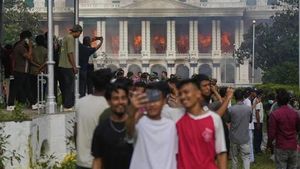President Donald Trump has signed an executive order to declassify thousands of documents related to the assassinations of former President John F. Kennedy, his brother Robert F. Kennedy, and civil rights leader Martin Luther King Jr. This move, hailed by some as long overdue, has ignited debates and speculation about the details surrounding these pivotal moments in American history.
Trump, who began his second term last week, promised the release of these documents during his reelection campaign, asserting, "Everything is going to be revealed." This statement was made as he signed the order at the White House, on January 12. He acknowledged the lengthy history of conspiracy theories surrounding these killings and stressed the public's right to know the truth.
The anticipated release stems from the 1990s mandate requiring the government to open all assassination-related records by 2017. Millions of documents were released by then, but around 3,000, primarily from the CIA, remain classified, fueling public curiosity. Some documents detailing communications between Lee Harvey Oswald and officials at the Soviet and Cuban embassies just weeks before Kennedy's assassination have already been revealed, adding to historical controversy.
Prior to this order, Trump had resisted releasing some files due to concerns over national security, following appeals from agencies such as the CIA and FBI. Now, citing public interest, he stated, "The continued redaction and withholding of information is not consistent with the public interest. The release of these records is long overdue," marking a significant policy shift since his previous administration.
The executive order mandates rendering these documents publicly accessible, albeit through a structured release process. Within 15 days, the director of national intelligence and the attorney general must develop a plan to disclose the JFK records, with even more time allocated for the King and RFK files.
The respective assassinations have been subjects of relentless speculation. JFK was killed on November 22, 1963, during his motorcade ride through Dallas, Texas, where he was assassinated by Oswald, who was later killed by nightclub owner Jack Ruby. The Warren Commission concluded Oswald acted alone, but conspiracy theories persist, linking other potential suspects like the mafia or foreign governments.
Meanwhile, Martin Luther King Jr. was assassinated on April 4, 1968, at the Lorraine Motel in Memphis, Tennessee. His death incited violent protests and has been shadowed by doubts over whether James Earl Ray acted alone. The House Select Committee on Assassinations even suggested there may have been conspirators, but found no conclusive evidence tying the government to King’s death.
Conversely, RFK was assassinated on June 5, 1968, shortly after delivering his victory speech at the Ambassador Hotel. Sirhan Sirhan was convicted of the crime, but doubts linger about whether he acted alone, with some witnesses arguing there may have been another gunman present.
Public reaction has varied, with members of the Kennedy family showing both hope and skepticism. Robert F. Kennedy Jr., who is also Trump’s nominee for health secretary, expressed gratitude for the declassification order, asserting, "A government withholding information is inherently fearful of its citizens’ ability to make informed decisions." He welcomed the opportunity for transparency about his father and uncle's assassinations.
Not everyone agrees with this perspective; JFK's grandson, Jack Schlossberg, criticized the move, framing it as exploitation of his grandfather's legacy for political gain. He remarked, "Declassification is using JFK as a political prop, when he's not here to punch back." There is tension within the family, as differing views on whether full transparency should be sought collide.
Despite skepticism about what may be revealed, interest remains high. Larry J. Sabato, director of the University of Virginia Center for Politics, noted researchers and historians have maintained intense interest surrounding the circumstances of these assassinations, stating, "While many anticipate there won't be shocking revelations, the significance of the records matters immensely. It's about what our government did and how it responded to tragic losses."
The upcoming release of these files could shed additional light on the events surrounding these high-profile assassinations, all of which left indelible marks on the American psyche. Indeed, as anticipation builds, citizens are reminded of the painful history these men represent—powerful leaders silenced by violence, whose legacies continue to provoke discussion and, at times, division. With Trump’s decision, many wonder whether missing pieces to this complex and tragic puzzle might finally surface.



